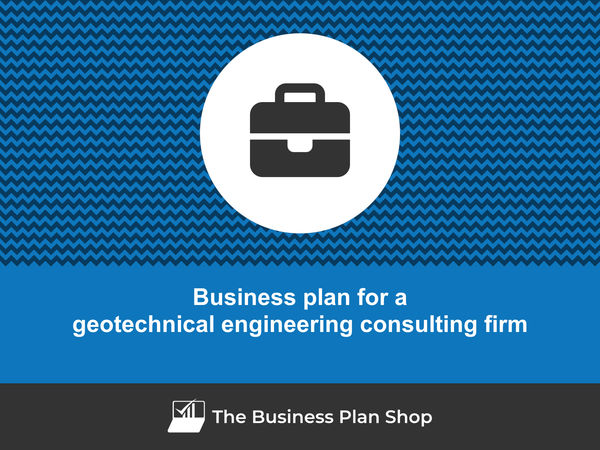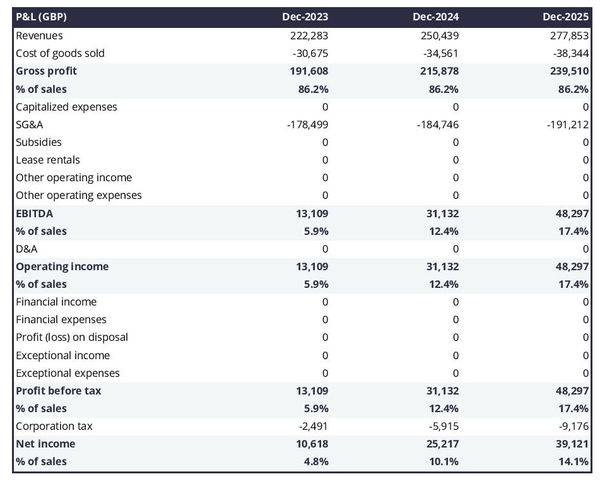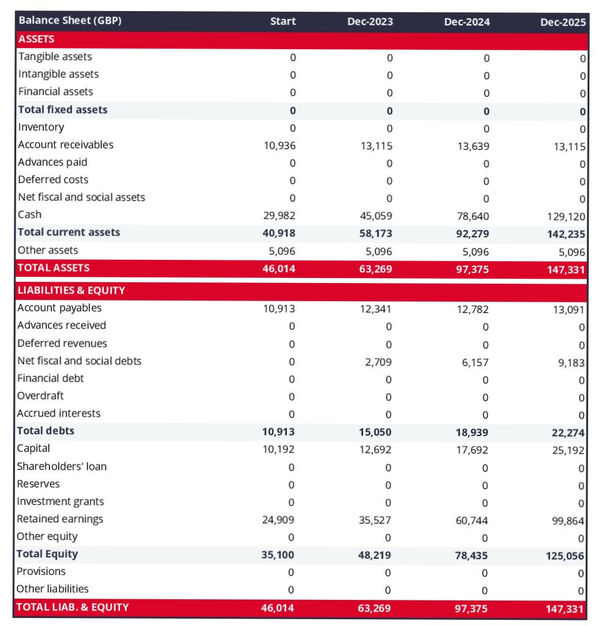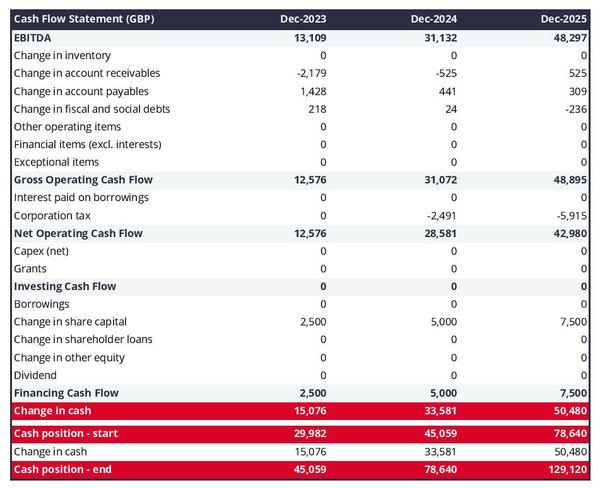How to write a business plan for a geotechnical engineering consulting firm?

Writing a business plan for a geotechnical engineering consulting firm can be an intimidating task, especially for those just starting.
This in-depth guide is designed to help entrepreneurs like you understand how to create a comprehensive business plan so that you can approach the exercise with method and confidence.
We'll cover: why writing a geotechnical engineering consulting firm business plan is so important - both when starting up, and when running and growing the business - what information you need to include in your plan, how it should be structured, and what tools you can use to get the job done efficiently.
Let's get started!
Why write a business plan for a geotechnical engineering consulting firm?
Understanding the document's scope and goals will help you easily grasp its structure and content. Before diving into the specifics of the plan, let's take a moment to explore the key reasons why having a geotechnical engineering consulting firm business plan is so crucial.
To have a clear roadmap to grow the business
Running a small business is tough! Economic cycles bring growth and recessions, while the business landscape is ever-changing with new technologies, regulations, competitors, and consumer behaviours emerging constantly.
In such a dynamic context, operating a business without a clear roadmap is akin to driving blindfolded: it's risky, to say the least. That's why crafting a business plan for your geotechnical engineering consulting firm is vital to establish a successful and sustainable venture.
To create an effective business plan, you'll need to assess your current position (if you're already in business) and define where you want the business to be in the next three to five years.
Once you have a clear destination for your geotechnical engineering consulting firm, you'll have to:
- Identify the necessary resources (human, equipment, and capital) needed to reach your goals,
- Determine the pace at which the business needs to progress to meet its objectives as scheduled,
- Recognize and address the potential risks you may encounter along the way.
Engaging in this process regularly proves advantageous for both startups and established companies. It empowers you to make informed decisions about resource allocation, ensuring the long-term success of your business.
To get visibility on future cash flows
If your small geotechnical engineering consulting firm runs out of cash: it's game over. That's why we often say "cash is king", and it's crucial to have a clear view of your geotechnical engineering consulting firm's future cash flows.
So, how can you achieve this? It's simple - you need to have an up-to-date financial forecast.
The good news is that your geotechnical engineering consulting firm business plan already includes a financial forecast (which we'll discuss further in this guide). Your task is to ensure it stays current.
To accomplish this, it's essential to regularly compare your actual financial performance with what was planned in your financial forecast. Based on your business's current trajectory, you can make adjustments to the forecast.
By diligently monitoring your geotechnical engineering consulting firm's financial health, you'll be able to spot potential financial issues, like unexpected cash shortfalls, early on and take corrective actions. Moreover, this practice will enable you to recognize and capitalize on growth opportunities, such as excess cash flow enabling you to expand to new locations.
To secure financing
Crafting a comprehensive business plan for your geotechnical engineering consulting firm, whether you're starting up or already established, is paramount when you're seeking financing from banks or investors.
Given how fragile small businesses are, financiers will want to ensure that you have a clear roadmap in place as well as command and control of your future cash flows before entertaining the idea of funding you.
For banks, the information in your business plan will be used to assess your borrowing capacity - which is defined as the maximum amount of debt your business can afford alongside your ability to repay the loan. This evaluation helps them decide whether to extend credit to your business and under what terms (interest rate, duration, repayment options, collateral, etc.).
Similarly, investors will thoroughly review your plan to determine if their investment can yield an attractive return. They'll be looking for evidence that your geotechnical engineering consulting firm has the potential for healthy growth, profitability, and consistent cash flow generation over time.
Now that you understand the importance of creating a business plan for your geotechnical engineering consulting firm, let's delve into the necessary information needed to craft an effective plan.
Need a convincing business plan?
The Business Plan Shop makes it easy to create a financial forecast to assess the potential profitability of your projects, and write a business plan that’ll wow investors.

Information needed to create a business plan for a geotechnical engineering consulting firm
Drafting a geotechnical engineering consulting firm business plan requires research so that you can project sales, investments and cost accurately in your financial forecast, and convince the reader that there is a viable commercial opportunity to be seized.
Below, we'll focus on three critical pieces of information you should gather before starting to write your plan.
Carrying out market research for a geotechnical engineering consulting firm
Before you begin writing your business plan for a geotechnical engineering consulting firm, conducting market research is a critical step in ensuring precise and realistic financial projections.
Market research grants you valuable insights into your target customer base, competitors, pricing strategies, and other crucial factors that can impact the success of your business.
In the course of this research, you may stumble upon trends that could impact your geotechnical engineering consulting firm.
You could find that potential clients may be interested in innovative geotechnical solutions that are more cost-effective and environmentally friendly. Additionally, they might be interested in geotechnical services that are tailored to their particular needs and objectives.
Such market trends play a pivotal role in revenue forecasting, as they provide essential data regarding potential customers' spending habits and preferences.
By integrating these findings into your financial projections, you can provide investors with more accurate information, enabling them to make well-informed decisions about investing in your geotechnical engineering consulting firm.
Developing the sales and marketing plan for a geotechnical engineering consulting firm
Budgeting sales and marketing expenses is essential before creating a geotechnical engineering consulting firm business plan.
A comprehensive sales and marketing plan should provide an accurate projection of what actions need to be implemented to acquire and retain customers, how many people are needed to carry out these initiatives, and how much needs to be spent on promotions, advertising, and other aspects.
This helps ensure that the right amount of resources is allocated to these activities in order to hit the sales and growth objectives forecasted in your business plan.
The staffing and equipment needs of a geotechnical engineering consulting firm
As you embark on starting or expanding your geotechnical engineering consulting firm, having a clear plan for recruitment and capital expenditures (investment in equipment and real estate) is essential for ensuring your business's success.
Both the recruitment and investment plans must align with the timing and level of growth projected in your forecast, and they require appropriate funding.
One possible staffing cost that a geotechnical engineering consulting firm might incur is the cost of hiring qualified engineers. This cost could include their salaries, benefits, and associated taxes. Another possible staffing cost is the cost of hiring soil technicians, who are responsible for conducting soil tests in the field. In terms of equipment costs, the firm might need to purchase specialized tools such as soil sample probes, augers, and other types of sampling equipment. Additionally, the firm might need to purchase computers and software for designing and modeling geotechnical projects. Finally, the firm might need to pay for transportation costs associated with getting personnel and equipment to and from project sites.
To create a realistic financial forecast, you also need to consider other operating expenses associated with the day-to-day running of your business, such as insurance and bookkeeping.
With all the necessary information at hand, you are ready to begin crafting your business plan and developing your financial forecast.
What goes into your geotechnical engineering consulting firm's financial forecast?
The financial forecast of your geotechnical engineering consulting firm's business plan will enable you to assess the growth, profitability, funding requirements, and cash generation potential of your business in the coming years.
The four key outputs of a financial forecast for a geotechnical engineering consulting firm are:
- The profit and loss (P&L) statement,
- The projected balance sheet,
- The cash flow forecast,
- And the sources and uses table.
Let's look at each of these in a bit more detail.
The projected P&L statement
The projected P&L statement for a geotechnical engineering consulting firm shows how much revenue and profit your business is expected to make in the future.

A healthy geotechnical engineering consulting firm's P&L statement should show:
- Sales growing at (minimum) or above (better) inflation
- Stable (minimum) or expanding (better) profit margins
- A healthy level of net profitability
This will of course depend on the stage of your business: numbers for a startup will look different than for an established geotechnical engineering consulting firm.
The forecasted balance sheet of your geotechnical engineering consulting firm
The projected balance sheet of your geotechnical engineering consulting firm will enable the reader of your business plan to assess the overall financial health of your business.
It shows three elements: assets, liabilities and equity:
- Assets: are productive resources owned by the business, such as equipment, cash, and accounts receivable (money owed by clients).
- Liabilities: are debts owed to creditors, lenders, and other entities, such as accounts payable (money owed to suppliers).
- Equity: includes the sums invested by the shareholders or business owners and the profits and losses accumulated by the business to date (which are called retained earnings). It is a proxy for the value of the owner's stake in the business.

Analysing your geotechnical engineering consulting firm projected balance sheet provides an understanding of your geotechnical engineering consulting firm's working capital structure, investment and financing policies.
In particular, the readers of your plan can compare the level of financial debt on the balance sheet to the equity value to measure the level of financial risk (equity doesn't need to be reimbursed, while financial debt must be repaid, making it riskier).
They can also use your balance sheet to assess your geotechnical engineering consulting firm's liquidity and solvency:
- A liquidity analysis: focuses on whether or not your business has sufficient cash and short-term assets to cover its liabilities due in the next 12 months.
- A solvency analysis: takes and longer view to assess whether or not your business has the capacity to repay its debts over the medium-term.
The projected cash flow statement
A cash flow forecast for a geotechnical engineering consulting firm shows how much cash the business is projected to generate or consume.

The cash flow statement is divided into 3 main areas:
- The operating cash flow shows how much cash is generated or consumed by the operations (running the business)
- The investing cash flow shows how much cash is being invested in capital expenditure (equipment, real estate, etc.)
- The financing cash flow shows how much cash is raised or distributed to investors and lenders
Looking at the cash flow forecast helps you to ensure that your business has enough cash to keep running, and can help you anticipate potential cash shortfalls.
It is also a best practice to include a monthly cash flow statement in the appendices of your geotechnical engineering consulting firm business plan so that the readers can view the impact of seasonality on your business cash position and generation.
The initial financing plan
The sources and uses table or initial financing plan is a key component of your business plan when starting a geotechnical engineering consulting firm.
It shows where the capital needed to set up the business will come from (sources) and how it will be spent (uses).

This table helps size the investment required to set up the geotechnical engineering consulting firm, and understand how risks will be distributed between the business owners, and the financiers.
The sources and uses table also highlights what the starting cash position will be. This is key for startups as the business needs to have sufficient funding to sustain operations until the break-even point is reached.
Now that you have a clear understanding of what will go into the financial forecast of your geotechnical engineering consulting firm business plan, let's have a look at the written part of the plan.
Need a convincing business plan?
The Business Plan Shop makes it easy to create a financial forecast to assess the potential profitability of your projects, and write a business plan that’ll wow investors.

The written part of a geotechnical engineering consulting firm business plan
The written part of a geotechnical engineering consulting firm business plan plays a key role: it lays out the plan of action you intend to execute to seize the commercial opportunity you've identified on the market and provides the context needed for the reader to decide if they believe your plan to be achievable and your financial forecast to be realistic.
The written part of a geotechnical engineering consulting firm business plan is composed of 7 main sections:
- The executive summary
- The presentation of the company
- The products and services
- The market analysis
- The strategy
- The operations
- The financial plan
Let's go through the content of each section in more detail!
1. The executive summary
In your geotechnical engineering consulting firm's business plan, the first section is the executive summary — a captivating overview of your plan that aims to pique the reader's interest and leave them eager to learn more about your business.
When crafting the executive summary, start with an introduction to your business, including its name, concept, location, how long it has been running, and what sets it apart. Briefly mention the products and services you plan to offer and your target customer profile.
Following that, provide an overview of the addressable market for your geotechnical engineering consulting firm, current trends, and potential growth opportunities.
Next, include a summary of key financial figures like projected revenues, profits, and cash flows.
Finally, in the "ask" section, detail any funding requirements you may have.
2. The presentation of the company
In your geotechnical engineering consulting firm business plan, the second section should focus on the structure and ownership, location, and management team of your company.
In the structure and ownership part, you'll provide an overview of the business's legal structure, details about the owners, and their respective investments and ownership shares. This clarity is crucial, especially if you're seeking financing, as it helps the reader understand which legal entity will receive the funds and who controls the business.
Moving on to the location part, you'll offer an overview of the company's premises and their surroundings. Explain why this particular location is of interest, highlighting factors like catchment area, accessibility, and nearby amenities.
When describing the location of your geotechnical engineering consulting firm, you could emphasize the potential for growth in the area. You could point out that the city is home to a large and growing population and has a growing need for geotechnical engineering services. You could also point out the city's proximity to other large cities, which could provide potential for expansion and diversification. You could also mention that the city is home to a number of universities and other educational institutions, which could provide a steady stream of qualified talent. Lastly, you could highlight the city's strong economy and business-friendly environment, which could provide a solid foundation for the firm's growth.
Finally, you should introduce your management team. Describe each member's role, background, and experience.
Don't forget to emphasize any past successes achieved by the management team and how long they've been working together. Demonstrating their track record and teamwork will help potential lenders or investors gain confidence in their leadership and ability to execute the business plan.
3. The products and services section
The products and services section of your business plan should include a detailed description of what your company offers, who are the target customers, and what distribution channels are part of your go-to-market.
For example, your geotechnical engineering consulting firm may offer services such as site exploration, engineering analysis, and laboratory testing. Site exploration entails field investigations to gather information about a project site, such as soil composition, topography, and subsurface conditions. Engineering analysis involves running complex simulations to determine factors such as the strength of the soil to ensure the stability of the project. Laboratory testing is used to measure properties of soil samples to assess the suitability of a particular soil for a project. These services can help customers make informed decisions about their geotechnical engineering projects, ensuring that their projects are safe and cost-effective.
4. The market analysis
When presenting your market analysis in your geotechnical engineering consulting firm business plan, you should detail the customers' demographics and segmentation, target market, competition, barriers to entry, and any regulations that may apply.
The goal of this section is to help the reader understand how big and attractive your market is, and demonstrate that you have a solid understanding of the industry.
You should start with the demographics and segmentation subsection, which gives an overview of the addressable market for your geotechnical engineering consulting firm, the main trends in the marketplace, and introduces the different customer segments and their preferences in terms of purchasing habits and budgets.
The target market section should follow and zoom on the customer segments your geotechnical engineering consulting firm is targeting, and explain how your products and services meet the specific needs of these customers.
For example, your target market might include engineering and construction firms who require geotechnical services for their projects. These firms need the expertise of geotechnical engineers to ensure the project is built to the highest safety standards and in compliance with local regulations. They also need efficient and reliable consulting services for soil analysis, risk management, and other engineering related services.
Then comes the competition subsection, where you should introduce your main competitors and explain what differentiates you from them.
Finally, you should finish your market analysis by giving an overview of the main regulations applicable to your geotechnical engineering consulting firm.
5. The strategy section
When you write the strategy section of your geotechnical engineering consulting firm business plan, remember to cover key elements such as your competitive edge, pricing strategy, sales & marketing plan, milestones, and risks and mitigants.
In the competitive edge subsection, elaborate on what makes your company stand out from competitors. This becomes especially important if you're a startup, aiming to carve a place for yourself amidst established players in the marketplace.
The pricing strategy subsection should demonstrate how you plan to maintain profitability while offering competitive prices to attract customers.
Outline your sales & marketing plan, detailing how you'll reach out to new customers and retain existing ones through loyalty programs or special offers.
For the milestones subsection, outline your company's achievements to date and your main objectives for the future, complete with specific dates to set clear expectations for progress.
Lastly, the risks and mitigants subsection should address the main risks that could affect your plan's execution. Explain the measures you've put in place to minimize these risks, assuring potential investors or lenders.
Your geotechnical engineering consulting firm may face risks from a variety of sources. For example, there is the risk of a project delay due to unforeseen circumstances such as inclement weather. Additionally, there is the potential risk of not having the necessary resources and personnel to complete a project on time, which could lead to client dissatisfaction and loss of reputation.
6. The operations section
The operations of your geotechnical engineering consulting firm must be presented in detail in your business plan.
The first thing you should cover in this section is your staffing team, the main roles, and the overall recruitment plan to support the growth expected in your business plan. You should also outline the qualifications and experience necessary to fulfil each role, and how you intend to recruit (using job boards, referrals, or headhunters).
You should then state the operating hours of your geotechnical engineering consulting firm - so that the reader can check the adequacy of your staffing levels - and any plans for varying opening times during peak season. Additionally, the plan should include details on how you will handle customer queries outside of normal operating hours.
The next part of this section should focus on the key assets and IP required to operate your business. If you depend on any licenses or trademarks, physical structures (equipment or property) or lease agreements, these should all go in there.
You may have certain key assets that are highly valuable to your geotechnical engineering consulting firm. Examples could include proprietary software that you have developed to help you complete projects more efficiently, or specialized equipment that you might use in field investigations. Additionally, your firm may have intellectual property such as trade secrets or copyrighted documents that contain unique and valuable information.
Finally, you should include a list of suppliers that you plan to work with and a breakdown of their services and main commercial terms (price, payment terms, contract duration, etc.). Investors are always keen to know if there is a particular reason why you have chosen to work with a specific supplier (higher-quality products or past relationships for example).
7. The presentation of the financial plan
The financial plan section is where we will include the financial forecast we talked about earlier in this guide.
Now that you have a clear idea of the content of a geotechnical engineering consulting firm business plan, let's look at some of the tools you can use to create yours.
What tool should I use to write my geotechnical engineering consulting firm's business plan?
There are two main ways of creating your geotechnical engineering consulting firm business plan:
- Using specialized business planning software,
- Hiring a business plan writer.
Using an online business plan software for your geotechnical engineering consulting firm's business plan
Using online business planning software is the most efficient and modern way to write a geotechnical engineering consulting firm business plan.
There are several advantages to using specialized software:
- You can easily create your financial forecast by letting the software take care of the financial calculations for you without errors
- You are guided through the writing process by detailed instructions and examples for each part of the plan
- You can access a library of dozens of complete business plan samples and templates for inspiration
- You get a professional business plan, formatted and ready to be sent to your bank or investors
- You can easily track your actual financial performance against your financial forecast
- You can create scenarios to stress test your forecast's main assumptions
- You can easily update your forecast as time goes by to maintain visibility on future cash flows
- You have a friendly support team on standby to assist you when you are stuck
If you're interested in using this type of solution, you can try The Business Plan Shop for free by signing up here.
Need a convincing business plan?
The Business Plan Shop makes it easy to create a financial forecast to assess the potential profitability of your projects, and write a business plan that’ll wow investors.

Hiring a business plan writer to write your geotechnical engineering consulting firm's business plan
Outsourcing your geotechnical engineering consulting firm business plan to a business plan writer can also be a viable option.
Business plan writers are experienced in writing business plans and adept at creating financial forecasts without errors. Furthermore, hiring a consultant can save you time and allow you to focus on the day-to-day operations of your business.
However, hiring business plan writers is expensive as you are paying for the software used by the consultant, plus their time, and their profit margin of course.
From experience, you need to budget at least £1.5k ($2.0k) excluding tax for a complete business plan, more if you need to make changes after the initial version (which happens frequently after the initial meetings with lenders or investors).
You also need to be careful when seeking investment. Investors want their money to be used to grow the business, not spent on consulting fees. Therefore, the amount you spend on business plan writing services (and other consulting services such as legal services) needs to be negligible relative to the amount raised.
The other drawback is that you usually don't own the business plan itself: you just get the output, while the actual document is saved in the consultant's business plan software - which makes it difficult to maintain the document up to date without hiring the consultant on a retainer.
For these reasons, outsourcing the geotechnical engineering consulting firm business plan to a business plan writer should be considered carefully, weighing both the advantages and disadvantages of hiring outside help.
Ultimately, it may be the right decision for some businesses, while others may find it beneficial to write their business plan using online software.
Why not create your geotechnical engineering consulting firm's business plan using Word or Excel?
Using Microsoft Excel and Word (or their Google, Apple, or open-source equivalents) to write a geotechnical engineering consulting firm business plan is not advisable. Allow me to explain the reasons.
Firstly, creating an accurate and error-free financial forecast on Excel or any spreadsheet demands technical expertise in accounting principles and financial modelling. Without a degree in finance and accounting and significant financial modelling experience, it's unlikely that the reader will fully trust your numbers.
Secondly, relying on spreadsheets is inefficient. While it may have been the go-to option in the past, technology has evolved, and software now performs such tasks much faster and more accurately.
The second reason is that it is inefficient. Building forecasts on spreadsheets was the only option in the early 2000s, nowadays technology has advanced and software can do it much faster and much more accurately.
And with the rise of AI, software is also becoming smarter at helping us detect mistakes in our forecasts and helping us analyse the numbers to make better decisions.
Moreover, software offers ease in comparing actuals versus forecasts and maintaining up-to-date forecasts for clear visibility on future cash flows, as we discussed earlier in this guide. Such tasks are cumbersome when using spreadsheets.
Now, let's address the written part of your geotechnical engineering consulting firm business plan. While it may be less prone to errors, using software can significantly boost productivity. Word processors lack instructions and examples for each section of your business plan. They also won't automatically update your numbers when changes occur in your forecast, and they lack automated formatting capabilities.
In summary, while some entrepreneurs may consider Word or Excel for their business plan, it's far from the best or most efficient solution when compared to specialized software.
Takeaways
- Having an up-to-date business plan is key to maintaining visibility on your future cash flows.
- A business plan has 2 parts: a financial forecast highlighting the expected growth, profitability and cash generation of the business; and a written part which provides the context needed to interpret and assess the quality of the forecast.
- Using business plan software is the modern way of writing and maintaining business plans.
We hope that this guide helped you to better understand how to write the business plan for a geotechnical engineering consulting firm. If you still have questions, do not hesitate to contact us.
Also on The Business Plan Shop
- How to write a 5 years business plan
- Internal business plan guide
- How long should your business plan be?
- Business plan formatting tips
- Business plan myths
Know someone who owns or wants to start a geotechnical engineering consulting firm? Share this article with them!




